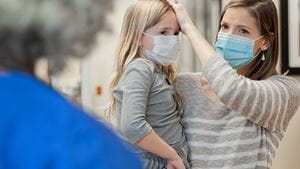
When someone has an unexpected injury or a sudden illness, it’s important to get the right care quickly. Sometimes, it can be unclear where to turn to for care – should you call 911? Visit your nearest urgent care location? Or go to the closest emergency room?
Often, people are torn between seeking care at an emergency room versus an urgent care facility. There are several differences between when and why someone should seek care at either a hospital or an urgent care.
“Trust your instincts when thinking about the care that’s needed,” said Ryan Peterson, PA, who is a provider with our virtual urgent care team. “If there’s a possibility of something life-threatening or serious trauma that requires immediate care, call 911 and visit the emergency department. If it’s a more minor injury or illness, urgent care may be the better choice.”
When someone is considering care in an emergency room, they should go for any of the following reasons:
At Rochester Regional Health, our Emergency Medicine teams provide essential care for patients with these types of sudden and severe illnesses or injuries, no matter what time it is. The moment a patient arrives, team members promptly take action and utilize all available resources to quickly assess, treat, stabilize, and monitor the person who needs care.
“If you think you or someone you know are experiencing a life-threatening injury or illness, we would always recommend that you call 911,” Peterson said. “Someone will be ready to take care of you.”
There are currently ten convenient Emergency Rooms where patients can find care across Western New York, the Finger Lakes region, and St. Lawrence County, including a pediatric emergency center at Rochester General Hospital.
When someone is seeking help in an urgent care setting, they should do so for non-emergency health concerns, such as:
Urgent care centers are helpful when patients can't meet with their primary care provider or pediatrician for an immediate evaluation.
Rochester Regional Health has 10 walk-in Urgent Care centers serving patients in Monroe, Genesee, and St. Lawrence Counties. Patients can check the information listed online to see their hours and contact information.
If you prefer a virtual appointment, Rochester Regional Health offers Same-Day Virtual Urgent Care from the comfort of your home, or wherever you are, 7 days a week for minor injuries and common illnesses.
Virtual urgent care providers are available 7 days a week from 7am until 10pm. The average wait time for virtual urgent care appointments is about 10 minutes.
Anyone over the age of 2 and living in New York state can request a virtual urgent care visit – there is no need to be a current patient with Rochester Regional Health or have a MyCare account.
“Virtual urgent care is a great option if patients have a tight schedule and can’t make it to a physical location,” Peterson said. “No matter what situation you find yourself in with your health, providers with Rochester Regional Health are ready to give you the best possible care when you need it most.”